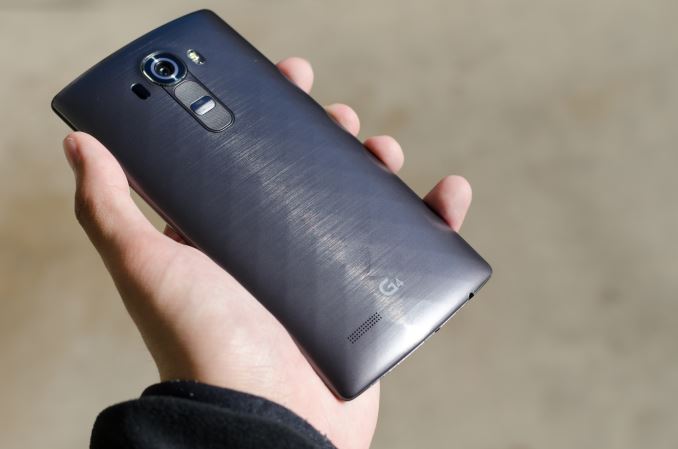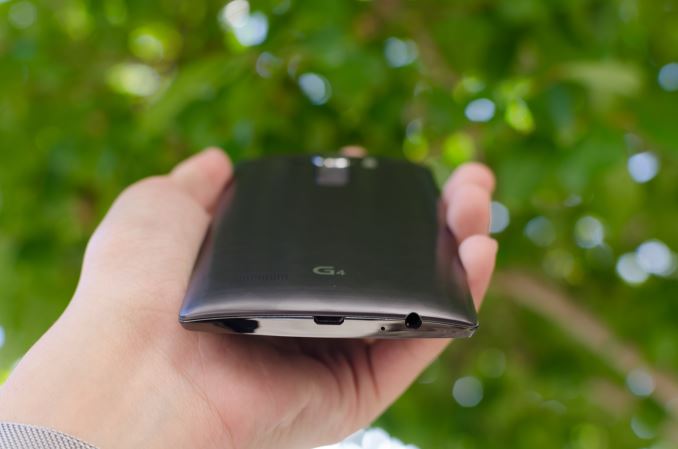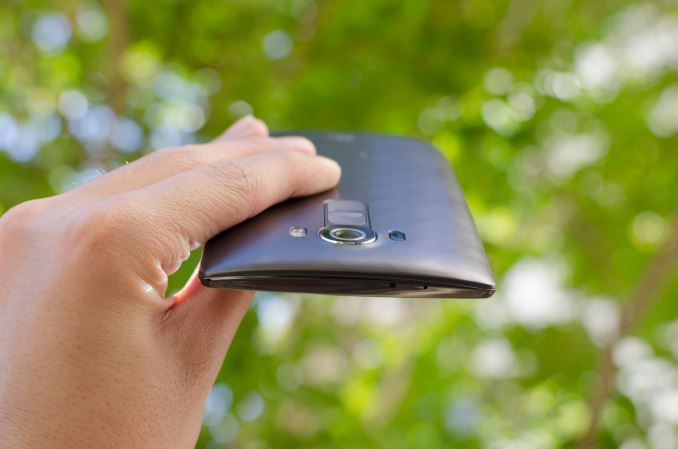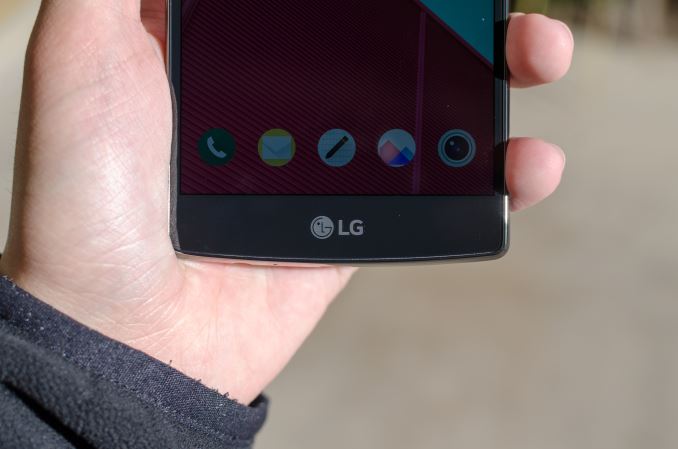The LG G4 Review
by Joshua Ho on July 30, 2015 10:00 AM EST- Posted in
- Smartphones
- Qualcomm
- LG
- Mobile
- Snapdragon 808
- LG G4
Final Words
LG’s flagship smartphone has, in my opinion, always represented the culmination of what LG as a conglomerate could in some sense achieve. LG’s G flagships have often shipped with LG Chem batteries, LG Innotek camera modules, LG Display LCDs, and LG Mobile’s design and integration. In order to really pass judgment on this effort as a whole, we have to re-examine each piece of the G4 to really understand the whole of the device.
Probably the first and most logical place to start is the design. Although LG hasn’t gone for aluminum unibody design or a glass back, the G4 manages to have some real authenticity in its design as they don’t seem to make any real attempt to dress up the fact that the phone is plastic. The glossy sides are a bit irritating, but overall I don’t have a lot to complain about here. The leather backs also help a great deal with improving in-hand feel for those that don’t want a plastic back cover. The removable back makes switching these covers out pretty easy, and also allows for removable battery and microSD, two features that can make or break a purchase for those that need them.
The squared-off design does make it harder to use with one hand though, and as a result this phone is really more like a small phablet than a big phone. I suspect that people would be happier with one phone at 68-70 mm wide, and another at 78-80mm wide with appropriate height and thickness as this would mean that there is choice between a phone that can be easily used with one hand and another that is designed for two hands but still easily portable.
Moving past design, the display of the G4 is fully capable of being incredible. The gamut of the display is wide, the brightness is high, the display controller supports panel self-refresh/GRAM, the resolution is great, and contrast is also incredible for an LCD. However, the calibration is rather disappointing as it’s just too blue, and colors are generally too saturated and somewhat cold. Here, I think LG really needs to consider either solely targeting an accurate sRGB profile, or allowing a toggle between a vivid mode and an accurate mode or something similar.
And to be fair to LG, this display is still a major step forward from the G3, as the sharpening effects on the G3 made it very hard to use the G3 for extended periods of time, but I still think LG needs to focus more on accurate display. I do think there is value to 1440p in a 5.5” display, but below 5 inches it doesn’t make sense to use 1440p as the One M7’s display is still comparable to the G4 in terms of perceived resolution for me. I still don’t think resolution is all that important at this point though, as 1080p is sufficient even for a 5.5” display.
Probably one of the most discussed features of the G4 this year though is the camera. While the upgrade in camera quality from the G2 to the G3 was relatively minor, the jump this year is rather significant. Low light performance has dramatically improved, as has the camera UI, camera features, camera latency, and camera post-processing. To that end this camera is probably one of the best I’ve ever used in an Android smartphone.
Looking at the camera holistically, I would still give a slight edge to the G4 over the Galaxy S6 due to my personal emphasis on still image quality over video. If the GS6 is roughly equal to or slightly worse than the iPhone 6 Plus as a camera overall, I would say the G4 is roughly equal to the iPhone 6 Plus, as photo quality, shot latency, 4K video, and camera UI are arguably superior, but the iPhone 6 Plus has better focus latency in most conditions, better slow motion video, better 1080p video, 1080p60 video, and arguably more natural image processing. With some less aggressive noise reduction on the GS6 and a better camera UI, I suspect that the G4 and Galaxy S6 would end up in a dead heat, which is great to see after the rather disappointing cameras of 2014 Android flagships.
I’m also not going to dwell too much on battery life other than to say that LG has done a great job here improving over the LG G3. With the new display and Snapdragon 808, LG manages to dramatically improve battery life to the point that it’s comparable to something like the Galaxy Note 4 on WiFi, and with LTE it seems that Qualcomm’s modem expertise has definitely paid off as only the OnePlus One and devices like the Ascend Mate 2 really edge out the G4. Battery efficiency on compute-heavy tasks does fall slightly short of the Galaxy S6, but the larger battery helps to even things out for the most part, and sustained performance is much better than what we see on the Snapdragon 810. Charge time is also acceptable, but not necessarily as ridiculously quick with the stock charger.
Overall, system performance is also noticeably better than the Snapdragon 810 devices that we’ve tested so far in pretty much everything but the GPU, and the G4 only slightly trails the Galaxy S6 in most situations which is a bit of a surprise. If you aren’t too concerned about intense emulators or similar tasks that really need all the GPU and CPU power possible, the G4 should deliver more than enough power for everyday tasks that most people will use their smartphones for.
Moving on to somewhat more subjective territory, LG’s UI is surprisingly good, but in need of some polish. I feel like a lot of people strongly criticize LG’s UI and place it around the level of previous iterations of TouchWiz, but in practice I’ve actually found a lot of relatively smart UI features that are well-integrated into the phone. For example, it’s easy to check the time and notifications simply by swiping down on the display while the screen is off. KnockOn is also a smart feature, although not necessarily new. In general, apps are relatively well-designed, and I have all the functionality that I’m expecting from these apps. LG just needs to continue working on optimizing their UI for better performance and also focusing on better design cohesiveness with AOSP UI and general design consistency.
Finally, looking at the bigger picture, let's talk about how the LG G4 fares versus its competition. If we look at the current Android smartphones as competitors, as far as flagship phones go I feel that the Galaxy S6 is really the only other phone up to the G4's caliber, and by extension the best point of comparison. Relative to the Galaxy S6, you lose the ability to use the phone with one hand comfortably, and the design is arguably not as nice to hold in the hand, but you gain a removable battery and microSD card slot, along with a larger display. The SoC in the G4 is definitely not as good as the one in the Galaxy S6, but the larger battery compensates for it in most situations so battery life is about the same.
Meanwhile judging things from a visual point of view, the display of the G4 isn’t as good as a whole compared to the Galaxy S6 if you care about color accuracy, but if you don’t the two are effectively equals. The camera is slightly better on the G4, but the differences are mostly a difference of post-processing rather than anything else. The UIs are almost neck and neck, and completely subjective in terms of user preference.
Ultimately when it comes to comparing the G4 to the Galaxy S6, I think that there are clearly different audiences that would feel very strongly that they would want one or the other. But at the end of the day it’s really hard for me to decide which one is better. I suspect that the real difference in the end simply comes down to size.














84 Comments
View All Comments
hans_ober - Thursday, July 30, 2015 - link
Hoping the Moto G review comes out in the next 2 days!Flunk - Thursday, July 30, 2015 - link
It's a shame this doesn't have a 5" 1080p display, then it would be perfect.hans_ober - Thursday, July 30, 2015 - link
Yeah, 720p is fine, but 1080p is a noticeable improvement. Stuff is visibly sharper.Bigger battery + Better GPU would have also been needed to maintain parity.
jjj - Thursday, July 30, 2015 - link
Funny how the tone changes with the manufacturer instead of being proportional with the numbers.But even more amazing is that everybody when talking iphone camera fully ignores the resolution. The thing has 2-3 times fewer pixels that the "nermal"high res phone cams. No matter the methodology of factoring in the res , the iphone still starts with at least a 20-30% handicap in the final grade. But almost everybody just ignores the res, like it's not there at all. Granted,that's the norm for any iphone flaw or missing feature.
Anyway, hope you guys stop being so lazy, get rid of every SoC banchmark you are using now and replace them with something useful.
boostern - Thursday, July 30, 2015 - link
There are other websites that already do that. We are here reading Anandtech because we like "every SoC benchmark", for us it is useful.hans_ober - Thursday, July 30, 2015 - link
Yeah, many websites give you a tldr, which appeals to a normal user: "the phone is fast blah blah"Then you have other websites that post benchmarks and stuff for "tech guys" : "octa core.. 1080p blah "
Aand then there's Anandtech. Don't get me started on their deep-dives.
Impulses - Thursday, July 30, 2015 - link
Hmm, if it were something like 12mp vs 16mp+ I'd say it'd be fair to downplay res, but 8 vs 16 and beyond really does make a big difference when it comes to printing or even cropping for tighter framing online.Nerdy Geek - Thursday, July 30, 2015 - link
I am surprised that you say the LG G4 and jesusPhone+ have a better camera. Both DPreview and DXO mark says otherwise by a large margin for the S6 (except perhaps in manual mode on the G4 in low light). From my short time with a S6 Edge I would agree (also had 6 and 6+ for about 2 weeks)grayson_carr - Thursday, July 30, 2015 - link
I'm surprised too. I used the Galaxy S6 for 2 months and the G4 for 1 month and did several side by side camera comparisons. I thought the Galaxy S6 had a better auto mode and took better pictures in good lighting, and the G4 had a superior manual mode and took better pictures in low light. In auto mode in daylight, I found that the G4 was too hesitant to use HDR, probably because it is rather slow compared to the real time HDR on the S6. And the G4 often produced either overly soft or overly sharpened photos.phoenix_rizzen - Thursday, July 30, 2015 - link
Took them a couple years and several phone iterations, but it looks like they may have finally come out with an upgrade for the LG G2.